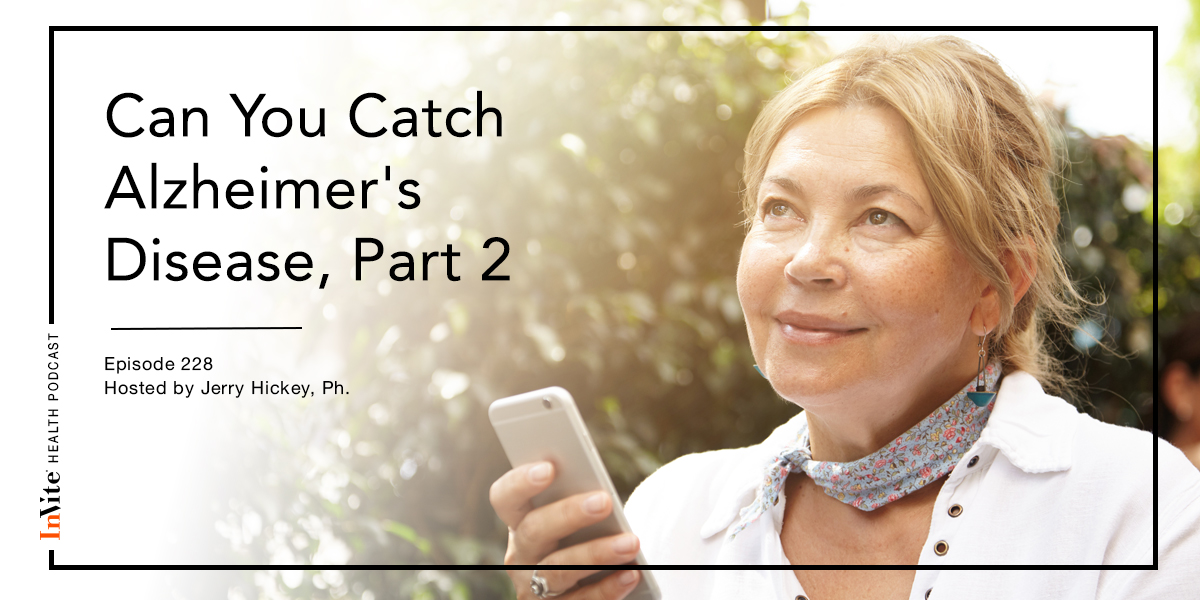Can You Catch Alzheimer’s Disease?, Part 2 – InVite Health Podcast, Episode 228

Alzheimer’s
Invite Health Podcast, Episode hosted by Jerry Hickey. Ph
Subscribe Today!
In part one of this podcast episode, we discussed evidence that specific and varied infections organisms, certain viruses and bacteria, can trigger the effects of Alzheimer’s disease. I also discussed the other theory that it’s plaque, beta-amyloid plaque. The truth of the matter is that researchers are weaving together both of these ideas, that the infectious organisms are triggering the formation of plaque and that’s triggering the Alzheimer’s disease.
If you missed part one, you can catch up here.
The role of genetics in Alzheimer’s disease
Now, we come to genes, which I also touched on in the first part of this episode.
A report in the Journal of Alzheimer’s Disease done by Indiana University School of Medicine and the St. Vincent Medical Group in Indianapolis looked at the susceptibility gene, the APOE e4 gene. If both of your parents donate their APOE e4 gene to you, that could be a problem because that gene’s involved with plaque in the heart and with Alzheimer’s disease. That doesn’t mean it’s written in stone. You can do things to help protect yourself. But if you have that gene, there’s a higher likelihood that you can develop Alzheimer’s disease.
In this study, the researchers were looking to see if pathogens interact with the susceptibility gene to cause sporadic cases of Alzheimer’s disease. They’re not saying all Alzheimer’s diseases come from this, but they’re saying that between the gene and the infections, there’s increasing inflammation in the brain. They’re saying that especially the herpes simplex type 1 gene, cytomegalovirus, chlamydia pneumonia, spirochetes, helicobacter pylori and various bacteria you get from gum disease. There’s a lot of evidence for all of these getting into the brain and/or causing inflammation in the brain.†
They actually enter the brain through the part of the brain that senses odors. In fact, one of the first symptoms of Alzheimer’s disease is a loss of your sense of smell. There’s a lot of evidence that bacteria are somehow getting into this nerve and then get into a part of the brain called the entorhinal cortex, which is like one of your GPS’s inside your brain. That seems to be where Alzheimer’s damage really starts and takes off and spreads out from. It’s not that far from other parts of the brain that are really important for memory and cognitive functions. Your entorhinal cortex is connected closely to your dentate gyrus and your hippocampus, so it’s plausible.†
Researchers Say This Type of Dementia is Curable – InVite Health Podcast, Episode 216. Listen now >>
The researchers went on to report that these pathogens are able to evade destruction by our immune system, leading to longstanding infection. Bacterial and viral DNA and RNA and bacterial proteins increase the expression of pro-inflammatory molecules, molecules made by the immune system that inflame us and activate all parts of our immune system. The researchers say that these bacteria and viruses lead to Alzheimer’s disease damage, like a buildup of plaque in the brain, damaged tau proteins, brain injury and the death of brain cells.†
Then, they talk about the susceptibility gene for heart disease and Alzheimer’s disease called APOE e4 gene. The researchers say it enhances brain infiltration by pathogens including herpes virus and chlamydia pneumonia and it’s involved with increased inflammation in the immune system.†
Listen to the full podcast for more research about the relationship between pathogens, genetics and Alzheimer’s disease.
Thank you for tuning in to the Invite Health Podcast. You can find all of our episodes for free wherever you listen to podcasts or by visiting www.invitehealth.com/podcast. Make sure you subscribe and leave us a review! Follow us on Facebook, Twitter and Instagram at Invite Health today. We’ll see you next time on another episode of the Invite Health Podcast.

